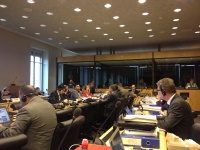Home » Saudi Arabia » KSA - News » Saudi Arabia: UN Experts Express Concern Over Torture Situation in the Country
Definition of torture
As indicated by Alkarama, the only legislative provision prohibiting torture in Saudi Arabia states that "an arrested person shall not be subjected to any bodily or moral harm. Similarly, he shall not be subjected to any torture or degrading treatment." The UN experts noted with concern that this provision is not sufficient to criminalise torture, as it "does not explicitly define torture in a manner reflecting Article 1* of the Convention, nor does it contain specific criminal penalties for torture." Therefore, the CAT asked the State whether it is "taking any measures to expressly incorporate the crime of torture within its domestic law."
Corporal punishments
While Alkarama expressed its concern over the use of corporal punishment both as a sanction following an unfair trial and as a disciplinary method in prison, the UN experts requested the State to indicate whether it "has taken steps to prohibit the imposition by judicial and administrative authorities of corporal punishments, such as flogging and amputation of limbs, which are in breach of the Convention." The CAT also asked information on "any measures taken by the State party to prevent the full implementation of existing judicial sentences involving corporal punishment, such as the sentence of 1,000 lashes, as well as 10 years' imprisonment and a fine, imposed on blogger Raef Badawi," whose case was brought to their attention by Alkarama.
Anti-terrorism law
In its submission, Alkarama noted that the anti-terrorism law enacted in January 2014 defines terrorism in vague terms, allowing it to be used against opposing voices, and violating the detainees' fundamental guarantees. Concerned that this law may "have negatively affected the State party's provision of safeguards against torture to persons deprived of their liberty in law and practice," the CAT asked the Saudi authorities to clarify the definition of terrorism applied by the authorities and to explain the State party's efforts to prevent torture in terrorism cases.
Statements made under torture
In its submission, Alkarama highlighted that Saudi law does not clearly prohibit the use of statements obtained under torture in court, noting that the State Party's "legal system places undue importance on confessions as the sole evidence in prosecutions, despite numerous reported cases of torture in order to obtain such confessions." Subsequently, the CAT members asked the State to "clarify whether any domestic legal provision explicitly prohibits the use in judicial proceedings of statements made as a result of torture."
Repression of civil society
Concerned over reprisals against human rights defenders who documented cases of torture, such as members of the Saudi Civil and Political Rights Association (ACPRA) as well as lawyers such as of Waleed Abu Al Khair, Alkarama brought several cases to the attention of the CAT in its contribution. Subsequently, the UN experts asked the Saudi authorities to "comment on the disbanding of the Saudi Civil and Political Rights Association and the arrest and imprisonment of its founders and members," as well as on "the arrest and imprisonment of Waleed Abu Al Khair, founder of Monitor of Human Rights in Saudi Arabia; and the arrest and imprisonment of Mikhlif Al Shammari, a human rights defender and former member of the Human Rights Commission."
What is next?
Saudi Arabia is to provide its response to the List of Issues in writing before its review on 22 and 25 April 2016, during which the State Party's implementation of the UN Convention against Torture (CAT) in the country will be assessed. Alkarama will be contributing to the review by submitting an alternative report and meeting with the Committee's experts to bring its concerns to their attention.
For more information or an interview, please contact the media team at This email address is being protected from spambots. You need JavaScript enabled to view it. (Dir: +41 22 734 1008).
*UNCAT, Art. 1: For the purposes of this Convention, the term "torture" means any act by which severe pain or suffering, whether physical or mental, is intentionally inflicted on a person for such purposes as obtaining from him or a third person information or a confession, punishing him for an act he or a third person has committed or is suspected of having committed, or intimidating or coercing him or a third person, or for any reason based on discrimination of any kind, when such pain or suffering is inflicted by or at the instigation of or with the consent or acquiescence of a public official or other person acting in an official capacity. It does not include pain or suffering arising only from, inherent in or incidental to lawful sanctions.
 Algeria
Algeria Bahrain
Bahrain Djibouti
Djibouti Egypt
Egypt Iraq
Iraq Palestine/Israel
Palestine/Israel Jordan
Jordan Kuwait
Kuwait Lebanon
Lebanon Libya
Libya Mauritania
Mauritania Morocco
Morocco Oman
Oman Qatar
Qatar Saudi Arabia
Saudi Arabia Sudan
Sudan Syria
Syria Tunisia
Tunisia United Arab Emirates
United Arab Emirates Yemen
Yemen Other Countries
Other Countries







